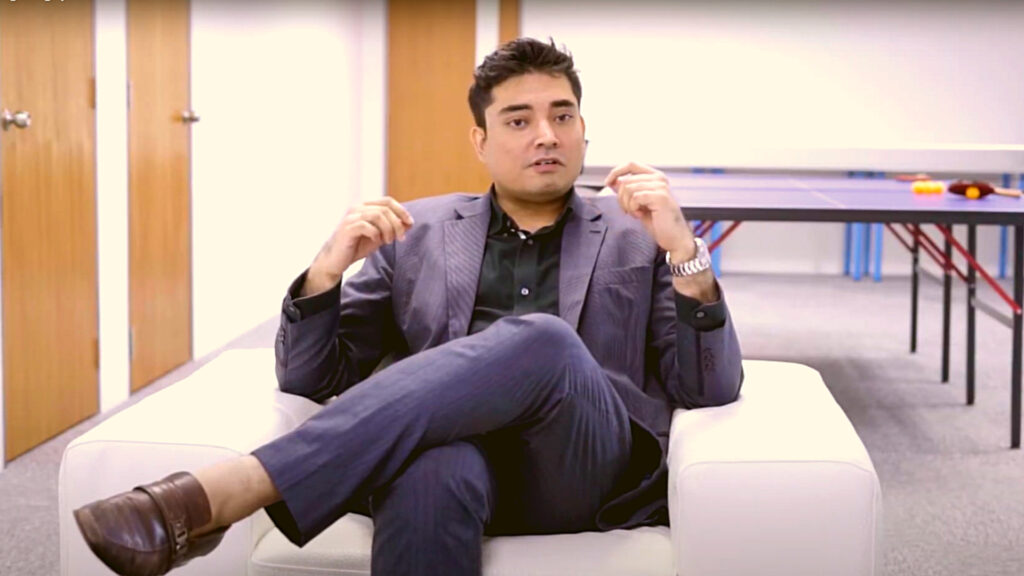Sancy Suraj, a record-breaking memory coach and trainer, has made headlines in Singapore for his impressive memory recall abilities. From identifying all 197 capital cities in just 7 minutes and 39 seconds to reciting 1,505 digits of pi, Suraj has become a master of memory techniques and exercises. But how did Suraj go from being an “Average Joe” to a memory pro? In this article, we’ll explore Suraj’s journey and learn about some of his most effective memory training techniques.

What first inspired you to become interested in memory training, and how did you go from being an “Average Joe” to becoming a top memory coach and trainer?
Thank you for the question. I’d be happy to share my story and how I went from being an “Average Joe” to becoming a top memory coach and trainer.
It all started back in 2011 when I stumbled upon a book on memory techniques. I was immediately intrigued by the idea that I could improve my memory and learn to remember things better, so I started to experiment with the techniques outlined in the book. At first, it was slow going, and I struggled to remember even simple things like phone numbers or names. But I kept at it, and over time, I began to see some improvement.
Fast forward a few years, and I decided to take my interest in memory training to the next level. I started to attend memory competitions and began competing myself. At first, I was nowhere near the top, but I learned a lot from watching other competitors and picked up some valuable tips and techniques.
Eventually, I began to place higher in competitions and even set a few records of my own. This gave me the confidence to start coaching and training others who were interested in improving their own memory skills. I started small, working with friends and family, but word soon got out, and before I knew it, I was coaching people from all over Singapore.
Over time, I developed my own unique approach to memory training, drawing from a variety of techniques and methods. I found that different people responded better to different techniques, so I tailored my coaching to each individual client. My goal was always to make memory training fun and accessible, and to help people unlock their full potential.
Today, I am proud to be considered one of the top memory coaches and trainers in Singapore, and I continue to work with clients from all walks of life. I believe that anyone can improve their memory with the right training and techniques, and it is incredibly rewarding to see people achieve their goals and unlock their full potential through memory training.
What are some of the most common challenges or misconceptions that people have when it comes to memory training, and how do you address them in your coaching?
Certainly, I’d be happy to address some of the most common challenges and misconceptions that people have when it comes to memory training, and how I address them in my coaching.
One of the biggest misconceptions that I encounter is that people believe that some individuals are simply born with a “good memory” and that there’s nothing they can do to improve their own memory skills. However, I believe that memory is a skill that can be developed and strengthened, just like any other skill. I work with my clients to help them understand that improving their memory is a process that takes time, effort, and practice.
Another common challenge that people face when it comes to memory training is that they struggle to remember information that they’re not interested in. I find that people often assume that they simply have a “bad memory,” when in reality, they just haven’t found a way to make the information more interesting or relevant to them. In my coaching, I work with clients to help them find ways to connect the information to things they’re interested in or to create memorable visual images that will help them recall the information later.
Finally, I find that many people are intimidated by the idea of memory training, either because they believe it will be too difficult or time-consuming or because they’ve tried it before and didn’t see immediate results. In my coaching, I strive to create a fun, engaging, and low-pressure environment where my clients can learn and practice memory techniques at their own pace. I also emphasize the importance of patience and persistence, and help my clients set realistic goals for themselves.
Overall, my goal as a memory coach is to help people overcome these challenges and misconceptions and develop the skills and confidence they need to improve their memory and achieve their goals. Whether someone is interested in memory competitions or simply wants to improve their ability to remember important information, I believe that memory training can be a valuable and rewarding experience for anyone.
Can you share some specific memory techniques or exercises that anyone can use to improve their memory and recall abilities, regardless of their starting point?
Certainly, there are several memory techniques and exercises that anyone can use to improve their memory and recall abilities, regardless of their starting point. One of the most effective techniques is the “memory palace” or “method of loci.” This technique involves creating a mental image of a familiar physical space, such as a house or a street, and then mentally placing items or information that you want to remember in different locations within that space. By mentally “walking” through the space and recalling the items or information associated with each location, you can easily remember and recall the information.
Another effective technique is the use of visual imagery. Our brains are wired to remember images more easily than words or abstract concepts, so by creating memorable visual images associated with the information you want to remember, you can improve your recall abilities. For example, if you’re trying to remember a person’s name, you could create a mental image of them with an object or characteristic that rhymes with their name.
Another useful technique is the use of acronyms or mnemonics. By creating a memorable acronym or phrase that incorporates the information you want to remember, you can improve your recall abilities. For example, if you’re trying to remember a list of items, you could create an acronym using the first letter of each item.
Finally, regular practice is essential for improving memory and recall abilities. Like any skill, memory training requires consistent practice and repetition. By regularly challenging your memory with exercises and techniques, you can gradually improve your ability to remember and recall information.
In my coaching, I work with clients to help them develop and practice these and other memory techniques and exercises. By tailoring the training to each individual’s unique learning style and goals, I help my clients build the skills and confidence they need to improve their memory and achieve their objectives.
“Unlock the power of your memory with simple yet powerful techniques. From memory palaces to visual imagery, acronyms to regular practice, you hold the keys to unlocking your limitless memory potential. With dedication and practice, you can unleash your memory superpowers and achieve extraordinary feats of recall.”
How do you balance the need for structure and routine in memory training with the importance of individualized instruction and personalization?
Balancing the need for structure and routine in memory training with the importance of individualized instruction and personalization is a key aspect of my coaching practice. On the one hand, structure and routine are essential for effective memory training. Memory techniques and exercises need to be practiced consistently and regularly over a period of time in order to build the neural connections necessary for improved memory and recall abilities.
At the same time, it’s important to recognize that each individual has unique learning styles, goals, and challenges when it comes to memory training. What works for one person may not work for another. That’s why I place a strong emphasis on personalization in my coaching practice. I work with each client to develop a customized training plan that takes into account their unique needs and preferences.
To achieve this balance between structure and personalization, I use a variety of tools and techniques. One of the most important is regular communication and feedback. I work closely with each client to monitor their progress and adjust their training plan as needed. This ongoing dialogue allows me to ensure that the training remains structured and consistent, while also being responsive to the individual’s needs and preferences.
I also use a variety of different memory techniques and exercises in my coaching practice, which allows me to tailor the training to each individual’s strengths and weaknesses. For example, some clients may respond better to visual imagery techniques, while others may benefit more from the method of loci or acronyms.
Ultimately, finding the right balance between structure and personalization is essential for effective memory training. By providing a structured framework for learning and practicing memory techniques and exercises, while also tailoring the training to each individual’s unique needs and preferences, I help my clients build the skills and confidence they need to achieve their memory goals.
What advice would you give to someone who is just starting out in memory training, and wants to make steady progress over time?
For someone who is just starting out in memory training and wants to make steady progress over time, my advice would be to start with the basics and build a strong foundation of memory techniques and exercises.
The first step is to understand the principles of memory and how it works. This includes learning about the different types of memory, such as short-term and long-term memory, and how information is encoded, stored, and retrieved in the brain.
From there, I would recommend starting with simple memory techniques, such as visualization and association, which can be applied to any type of information. It’s important to practice these techniques consistently and regularly, in order to build the neural connections necessary for improved memory and recall abilities.
As you become more comfortable with the basics, you can start to explore more advanced memory techniques and exercises, such as the method of loci and mnemonics. These techniques can be more challenging to master, but can also be incredibly powerful for improving memory and recall abilities.
Another important aspect of making steady progress in memory training is to set specific goals and track your progress over time. This can help you stay motivated and focused on your training, and allow you to see the improvements in your memory and recall abilities as you continue to practice and refine your skills.
Finally, it’s important to remember that memory training is a long-term process, and that progress may not always be linear. There may be times when progress feels slow or frustrating, but it’s important to stay patient and persistent, and to trust in the process. With consistent practice and dedication, anyone can make steady progress in memory training and achieve their memory goals.
“Build a solid foundation, practice consistently, and set clear goals to unlock the full potential of your memory. Remember, progress may not always be swift, but with perseverance and dedication, you can soar to new heights of memory mastery. The key is to trust the process and keep pushing forward, one step at a time.”
In our interview with Suraj, we asked him about some of the most common challenges or misconceptions that people have when it comes to memory training. Suraj shared that many people believe that they have a poor memory and are unable to improve it. However, Suraj stresses that memory is like a muscle that can be trained and strengthened over time. He emphasizes the importance of consistency and personalized instruction to help his clients achieve their memory goals.
We also asked Suraj about specific memory techniques or exercises that anyone can use to improve their memory and recall abilities. Suraj shared a few techniques, including the “memory palace” method, which involves creating a mental image of a location and placing pieces of information within it to aid recall. Suraj also emphasizes the importance of visualization and association in memory training, encouraging clients to create vivid mental images and connect new information to existing knowledge.
Another important aspect of memory training is balancing structure and routine with individualized instruction and personalization. Suraj shared that he creates tailored memory training plans for each of his clients, incorporating exercises and techniques that work best for their unique learning styles and memory goals. Suraj stresses the importance of consistency and accountability in memory training, while also recognizing the need for flexibility and adaptation.
Looking to the future, what are some new projects or initiatives that you’re excited to work on as a memory coach and trainer, and how do you see the field of memory training evolving in the coming years?

As a memory coach and trainer, I am always looking for new and innovative ways to help my clients improve their memory and recall abilities. In the coming years, I am excited to explore new technologies and tools that can be used to enhance memory training and make it more accessible and effective for people of all ages and backgrounds.
One area that I am particularly interested in is the use of virtual and augmented reality in memory training. These technologies have the potential to create immersive and interactive learning environments that can help individuals build stronger neural connections and improve their memory skills in a more engaging and effective way.
I am also excited about the growing interest in memory training among younger generations, and the potential for memory training to become a more mainstream and widely recognized field in the coming years. With the increasing importance of digital literacy and information overload in our daily lives, there is a growing need for individuals to develop strong memory and recall abilities, and I believe that memory training can play an important role in meeting this need.
Finally, I am committed to continuing to refine and develop my own techniques and approaches as a memory coach and trainer, in order to provide the highest level of support and guidance to my clients. This includes staying up-to-date on the latest research and developments in the field of memory training, as well as continually seeking feedback and input from my clients in order to tailor my approach to their individual needs and goals.
Overall, I am excited about the future of memory training and the potential for it to become an increasingly important and valued skill in our fast-paced and information-driven world. As a memory coach and trainer, I am committed to staying at the forefront of this field and helping individuals of all ages and backgrounds unlock their full memory potential.
“Embrace the future of memory training with open arms, as technology evolves and new possibilities emerge. Stay curious, adaptable, and committed to refining your techniques, and together, we can unlock the limitless potential of the human memory in this information-rich world.”
Sancy Suraj’s success as a memory coach and trainer is a testament to the power of consistent, personalized memory training. Through his techniques and exercises, Suraj has helped countless clients improve their memory recall abilities and achieve their goals. As the field of memory training continues to evolve, Suraj is excited to explore new projects and initiatives that can further enhance his clients’ abilities. Whether you’re an “Average Joe” or a memory pro, Suraj’s insights and advice can help you improve your memory and achieve your goals.





























